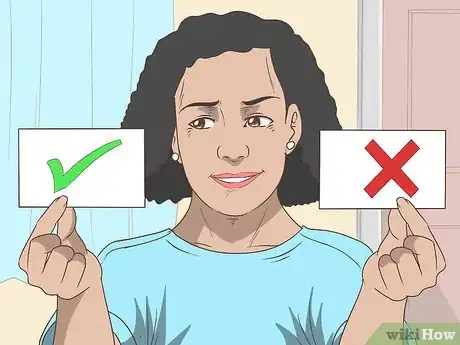This article was co-authored by Rahti Gorfien, PCC. Rahti Gorfien is a Life Coach and the Founder of Creative Calling Coaching, LLC. She specializes in working with artists, entrepreneurs, and college students in creative fields. Rahti is accredited as a Professional Certified Coach (PCC) by the International Coach Federation, an ACCG Accredited ADHD Coach by the ADD Coach Academy, and a Career Specialty Services Provider (CSS). In addition, she has personal experience in the fields she coaches - she is an alumnus of the New York University Graduate Acting program and has been a working theater artist for over 30 years. She was voted one of the 15 Best Life Coaches in New York City by Expertise in 2018.
There are 13 references cited in this article, which can be found at the bottom of the page.
wikiHow marks an article as reader-approved once it receives enough positive feedback. In this case, 100% of readers who voted found the article helpful, earning it our reader-approved status.
This article has been viewed 45,190 times.
Independence is learned, not inborn. Many people don’t become truly independent, even as adults, because they let fear dictate their choices and depend too much on other people’s approval. Don’t limit your potential this way – take charge of your life instead. You can become independent and unafraid by learning to rely on yourself, improving your confidence, and setting goals that take you in the direction you want to go.
Steps
Becoming Self-Sufficient
-
1Take responsibility for yourself. Acknowledge the ways your actions, words, and decisions have shaped your life. Don’t try to blame other people or outside circumstances for the way your life looks right now, even if you’re not happy with your current situation.
- Taking responsibility doesn’t mean blaming yourself for mistakes you made in the past. Rather, this mindset empowers you to do something about them now.
-
2Get to know yourself. Spend some time introspecting when you won’t be disturbed or distracted. Ask yourself what your personality is like when you’re not being influenced by anybody else. Think about your unique strengths, weaknesses, and values.[1]
- Self-knowledge is an essential foundation for an independent life. You can better get to know yourself by starting a journaling habit and trying out new activities to learn your likes and dislikes.
Advertisement -
3Trust your own judgment. Learn to rely on your own decision-making skills instead of other people’s advice. If you frequently second-guess yourself, remind yourself that it’s better to make a choice and stick with it than to remain in a perpetual state of indecision.[2]
- If you have a hard time with decisions, build your confidence in yourself by becoming more decisive about little things. When you’re picking out clothes in the morning, for instance, go with your first instinct and don’t give yourself time to waver.
-
4Live by your values. Know which principles are most important to you, and use them to guide your decisions. Seek out jobs, friends, and opportunities that align with your values instead of clashing with them.[3]
- Money has a big impact on our daily lives. If you’re having trouble discerning your values, consider what you would be doing if money were not a factor in your life. Try to live by those core principals.
- Identify your values by ranking which of your personality traits mean the most in your life. For instance, you might value honesty, charity, and friendship most of all.
-
5Learn to rely on yourself emotionally. Practice regulating your own feelings instead of depending on a friend, cigarette, or candy bar to calm down.[4] Be kind and encouraging to yourself. Find some healthy ways to deal with negative emotions, such as taking a walk or writing in a journal.
- It’s fine to seek external emotional support when you need it. However, it’s not healthy to rely on other people or substances as a crutch for dealing with your feelings.
- Practice noticing negative feelings that come up without being swept away by them. Acknowledge the feeling, but don’t become the feeling.
Dealing with Fear
-
1Face your fears. One of the most effective ways to grow as a person is to face the things that scare you most. Look for ways to get out of your comfort zone every day, whether that means talking to someone new, learning to drive, or taking on new responsibilities at work.[5]
- If your fear is too big to tackle all at once, do it a little at a time. Set a small, manageable goal to start with. After you achieve it, set another one that’s slightly more challenging.
- For instance, if you’re afraid to travel alone, take a short day trip to a nearby town. Then take an overnight trip a little farther away.
-
2Entertain the worst-case scenario. This may sound counterintuitive, but one effective way to conquer fear is by thinking of the worst. Contrary to what you might believe, this won't make you crawl up in a ball. In fact, you'll feel capable once you realize the worst is either unlikely or totally manageable.[6]
- Try this: when you have a fear, think about the worst possible scenario. For instance, you worry about not getting a promotion at work. What's the worst that can happen? You'll get passed up and be considered next time. Or, you finally decide to move on from your current job that doesn't recognize your talent. Whatever it is, it likely won't kill you.
-
3Plan ahead. Banish your jitters by preparing for things ahead of time. Whether you’re giving a speech, interviewing for a new job, or taking an exam, you’ll do better and feel calmer if you practice beforehand.[7]
- Ask a friend to help. Say, “I really want to knock this interview out of the park. Will you help me practice my questions?”
-
4Ask for help when you need it. Independence doesn't mean you don't need anyone. In fact, it's impossible to go through life without assistance from others. When you get overwhelmed by fear, have the courage to ask for help from those you trust.[8]
- You might seek the experience of a mental health therapist to help you cope with major fears.
- Or, you might simply ask a friend or family member to help you role-play anxiety-causing scenarios or accompany you to stressful events.
Building Confidence
-
1Pretend you feel confident. Stand tall, with your shoulders back. Maintain a calm demeanor. Make eye contact with people, and speak at an unhurried pace. Pretend that you feel completely comfortable in your own skin, and soon you’ll find that your confidence isn’t an act anymore.[9]
- “Fake it till you make it” is a common piece of advice for a reason: it works. Your actions have a big influence on your attitude.
-
2Look the part. Good grooming habits can make you feel better about yourself, which will give you a confidence boost. Practice good hygiene by showering every day, brushing your teeth, and trimming your nails. Wear clean, well-fitting clothes that are appropriate for the situation you’re in.[10]
- If you’re not confident in your appearance, consider getting a new haircut or investing in some flattering clothes.
-
3Focus on the positive. Thinking too much about the negative things you’ve said and done will only give you an inaccurate, overly negative self-image. Make an effort to remind yourself of all the good things you’ve done in the past, too. Consider the times you made someone laugh, worked hard at something, or helped somebody. Acknowledging the positive in your life will make you feel more positive as well.[11]
- Make a list of your positive qualities, good deeds, and successes. Look at your list when you’re feeling down about yourself.
- Try using an app, such as Gratitude Journal, to jot down three things daily that you are grateful for. It will help keep you in a positive mindset.
-
4Treat other people well. Focusing on yourself too much can make you self-conscious, so focus on other people instead.[12] Maintain an open, friendly demeanor, and lend a helping hand whenever you can. Look for the best in others.[13]
- Making genuine connections with other people will build up your self-esteem and social confidence.
Charting Your Own Course
-
1Set goals. Goals are the landmarks that help you make progress in life. Think about what you want to achieve, taking your personality and values into account. Then come up with a series of steps that will help you get there.[14]
- Set goals that matter deeply to you, and commit to reaching them, even if circumstances are tough and other people don’t support you.
- Set short-term and intermediate goals as well as long-term ones.
-
2Make your own decisions. When you’ve got a choice to make, think about what you want, not what your mother, partner, or best friend might want. If you don’t know what to do, take a deep breath, pick a course of action, and stick with it.[15]
- There’s nothing wrong with asking other people for input when you really need an outside perspective. Most of the time, though, you’re quite capable of making choices for yourself.
-
3Be patient and persistent. Even with hard work, your life probably won’t change overnight. Focus on making small changes at first, and celebrate all your successes, even the minor ones. Over time, independence will become a habit.
-
4Embrace failure. However much we’ve been trained to avoid them, mistakes are a normal and routine part of learning. When you reframe mistakes as learning tools rather than disasters, you can try new things without fear. This pushes you out of your comfort zone and helps you grow.
Expert Q&A
-
QuestionWhat can I do to be more emotionally independent?
 Rahti Gorfien, PCCRahti Gorfien is a Life Coach and the Founder of Creative Calling Coaching, LLC. She specializes in working with artists, entrepreneurs, and college students in creative fields. Rahti is accredited as a Professional Certified Coach (PCC) by the International Coach Federation, an ACCG Accredited ADHD Coach by the ADD Coach Academy, and a Career Specialty Services Provider (CSS). In addition, she has personal experience in the fields she coaches - she is an alumnus of the New York University Graduate Acting program and has been a working theater artist for over 30 years. She was voted one of the 15 Best Life Coaches in New York City by Expertise in 2018.
Rahti Gorfien, PCCRahti Gorfien is a Life Coach and the Founder of Creative Calling Coaching, LLC. She specializes in working with artists, entrepreneurs, and college students in creative fields. Rahti is accredited as a Professional Certified Coach (PCC) by the International Coach Federation, an ACCG Accredited ADHD Coach by the ADD Coach Academy, and a Career Specialty Services Provider (CSS). In addition, she has personal experience in the fields she coaches - she is an alumnus of the New York University Graduate Acting program and has been a working theater artist for over 30 years. She was voted one of the 15 Best Life Coaches in New York City by Expertise in 2018.
Life Coach One thing that you should do is let go of what people think of you and keeping other people happy.
One thing that you should do is let go of what people think of you and keeping other people happy. -
QuestionHow can I be an independent girl if I can't get rid of my fears?
 Paul Chernyak, LPCPaul Chernyak is a Licensed Professional Counselor in Chicago. He graduated from the American School of Professional Psychology in 2011.
Paul Chernyak, LPCPaul Chernyak is a Licensed Professional Counselor in Chicago. He graduated from the American School of Professional Psychology in 2011.
Licensed Professional Counselor The only way out of your fears is through your fears. You have to face your fears a little at a time.
The only way out of your fears is through your fears. You have to face your fears a little at a time.
References
- ↑ http://tinybuddha.com/blog/getting-to-know-yourself-what-you-like-and-what-you-want-in-life/
- ↑ https://www.inc.com/minda-zetlin/4-tips-to-stop-second-guessing-yourself-yes-really.html
- ↑ https://mrsmindfulness.com/how-to-live-your-truth-identifying-your-values-mastering-mindful-living/
- ↑ Rahti Gorfien, PCC. Life Coach. Expert Interview. 17 December 2019.
- ↑ https://www.psychologytoday.com/blog/how-be-yourself/201607/4-simple-steps-conquer-your-fears?collection=1095120
- ↑ https://www.psychologytoday.com/blog/how-be-yourself/201607/4-simple-steps-conquer-your-fears?collection=1095120
- ↑ https://www.pickthebrain.com/blog/5-simple-steps-to-be-independent/
- ↑ https://www.psychologytoday.com/blog/new-chapter/200908/the-courage-ask-help
- ↑ https://www.pgeveryday.com/family/parenting/article/8-ways-to-fake-self-confidence-until-its-real
- ↑ https://zenhabits.net/25-killer-actions-to-boost-your-self-confidence/
- ↑ http://www.success.com/blog/7-mental-hacks-to-be-more-confident-in-yourself
- ↑ Rahti Gorfien, PCC. Life Coach. Expert Interview. 17 December 2019.
- ↑ http://www.healthyplace.com/blogs/buildingselfesteem/2016/02/kindness-and-self-esteem/
- ↑ https://www.entrepreneur.com/article/238174
- ↑ http://www.melyssagriffin.com/be-more-independent/
About This Article
To be independent and unafraid, rely on your own decision-making skills rather than other people’s. If you find this difficult, try being decisive about little things, like quickly choosing which clothes you put on in the morning. Additionally, find ways to regulate your emotions, such as writing in a journal or taking a walk when you feel anxious. When you find yourself in a situation that makes you feel afraid, act confident by standing tall with your shoulders back and speaking at a steady pace, which will help your confidence grow over time. Additionally, do something each day that pushes you out of your comfort zone, like talking to a stranger or taking on more responsibilities at work. For moree tips from our co-author, including how to handle failure, read on!













































































